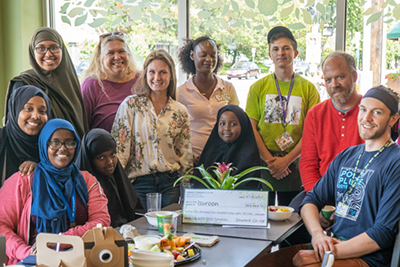
For cooperatives, concern for community is baked into their DNA. As one of the seven cooperative principles, business mission statements that root co-ops in their communities are common. But in a crisis, how does a co-op truly impact their community? And is it just for member-owners, or does it extend to the larger community? For Seward Community Co-op in Minneapolis, Minnesota, when a neighboring business was the victim of hate-fueled vandalism, it was clear they had to step up.
The Seward neighborhood in Minneapolis is a vibrant and diverse community. Many immigrants from east Africa have built businesses and homes there. When five businesses were targeted with vandalism along a street in the neighborhood just a few blocks away, the cashiers at Seward Co-op heard about it almost immediately from their members and customers.
“We walked down the street and said, ‘Hey, we’re here from Seward Co-op and we want you to know we stand with you and there’s no place for hate on our street,” said Abby Rogosheske, Seward’s Equity and Community Engagement Manager.
Using their SEED Program fundraising, the staff at Seward decided to choose the affected businesses as the recipients of their monthly Round-Up program—a fundraising program that allows customers to “round up” their bills and donate the extra cents to a different organization or cause each month.
“It’s one of the best tools we have for being able to connect with and support other parts of our community,” Rogosheske said. Because the Round-Up program aggregates cents from thousands of customers together to make an impact, it was a way to show how broad the support for the neighborhood was. “The support we wanted to show was a feeling of community rallying around these businesses,” Rogosheske added.
Each month, a typical Round-Up recipient can receive over $20,000 from the co-op. As of late October, they had fundraised over $17,500 for the affected Seward businesses. Since the program started in 2011, Seward Co-op is close to donating over $2 million dollars to local charities, organizations and causes in Minneapolis and Minnesota.
“With an average donation of 40 cents, it really represents the power of community and the power of the cooperative model,” Rogosheske said.
“With an average donation of 40 cents, it really represents the power of community and the power of the cooperative model.” – Abby Rogosheske, Seward Community Co-op
The typical recipients are selected by a committee of staff, cashiers and those interacting with customers and members every day from a pool of over 100 applications. Their priorities include food justice and racial equity. In crises, the committee can vote to fundraise for the near term to meet needs in the wake of natural disasters or, in this case, vandalism on their block.
For the affected businesses, it was one way to show the community was rallying around them. One of the businesses, Capitol Cafe, is also a member, with Seward Co-op, of the Main Street Alliance, an organization of over 30,000 small businesses advocating for a more inclusive and value-driven economy.
The Round-Up Campaign was also a way to introduce Main Street Alliance’s Hate Has No Business Here Campaign to customers and members of the co-op, showing how business leaders can take a stand against hate in their communities. In addition to fundraising for damages caused, the campaign works to create safe spaces and support minority-owned businesses in the community. According to Capitol Cafe’s owner, every time there is an incident or negative rhetoric about immigrants they lose regular customers who are afraid of frequenting a shop that might be targeted with this kind of violence.
“[One of] the ways you can support us is by coming… in to our pharmacies, barber shops and cafes,” Abdi Awad, Capitol Cafe’s manager, said in a Facebook post about the incident. Patronizing immigrant-owned businesses will help to support them in the long run, he said.


